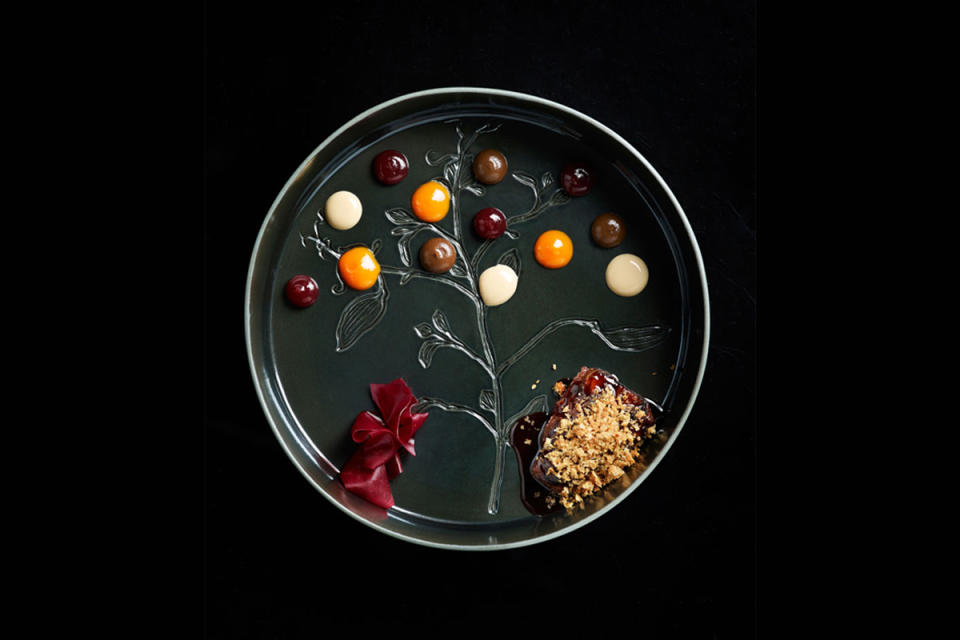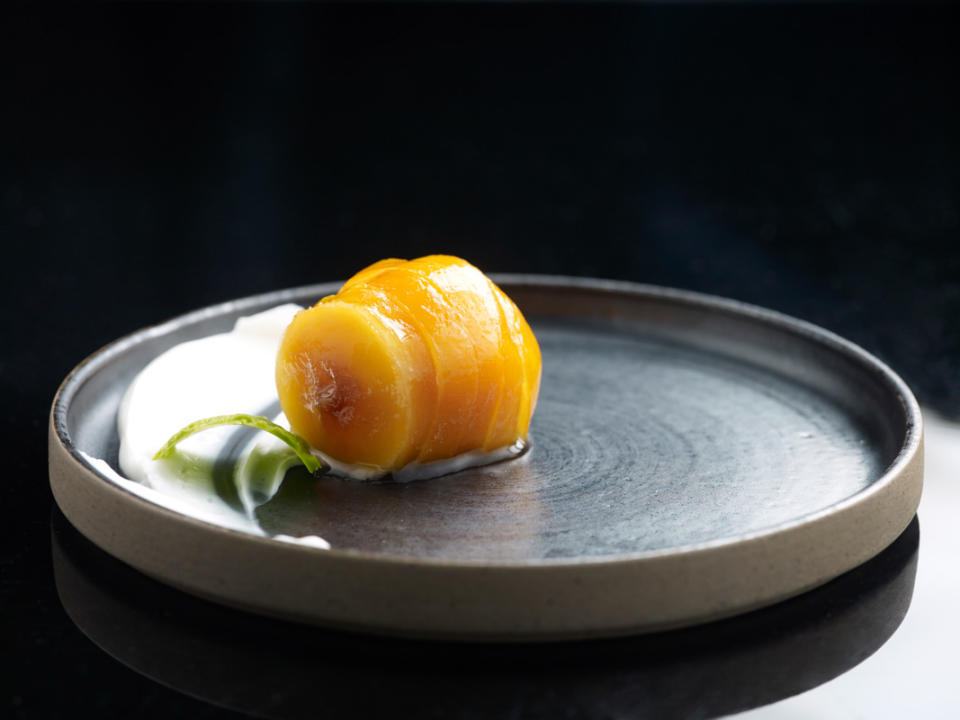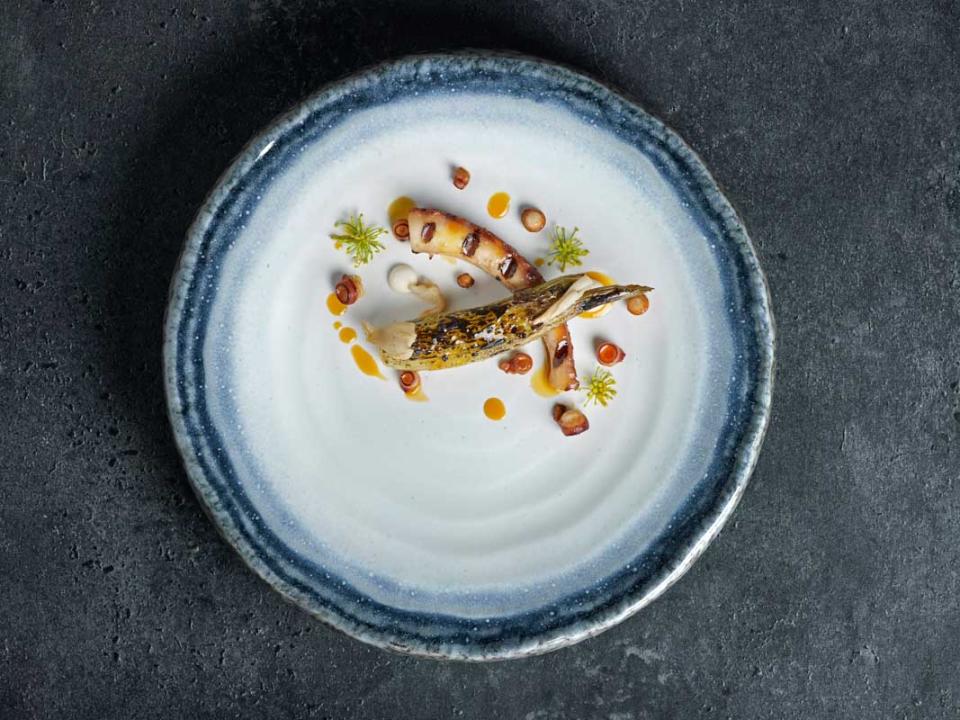INTERVIEW: Stellar at 1-Altitude's Isaac Henry might be a fine dining chef but he 'really, really loves' chicken rice

SINGAPORE — Talking to Chef Isaac Henry is like an exercise in the suspension of disbelief. It's hard to believe that the man with the culinary vision that could only be borne out of decades of experience, is only 25 years old. I've had the pleasure of experiencing his gastronomic creativity first hand, and I reckon age is also the reason why and how his creations turn out the way they do. It's bold, exciting, and so full of joy—but not in a way that might come across as being passé or pretentious. There's an endearingness to it that makes believing in his food philosophy that much easier, and palatable.
I walk in on him on a Wednesday afternoon at Stellar at 1-Altitude, hard at work on a meticulous presentation of a dish for the coming Valentine's Day. In between camera clicks, he cleans the plate so that it is spotless and pristine. "That's the kind of person I am. I'm very obsessed with detail, and although it is merely for photography, you can say that I've put in my heart and soul into its creation," he shares as we sit sipping wine on the 62nd floor of One Raffles Place, overlooking the enclave of Bugis. He asks that I give him a minute to reset as I place my recorder on the table and prepare my notes for this afternoon.
READ MORE:
10 simple hacks for reducing food waste
FOOD REVIEW: Stellar at 1-Altitude – ‘This is where you go to impress’
FOOD REVIEW: At Allium, food exists as a celebration of technique, flavour, and produce
Zatiman Astha: How do you describe what you do to someone you’re meeting for the first time?
Chef Isaac Henry: That’s pretty straightforward. I tell them I’m a chef and they’ll always reply with “Oh my God, no way! Really? Where’s your restaurant?” But I would describe my day to day job as making people feel happy through feeding them the food I make. It has always been like that since I was young.
What does food mean to you?
I enjoy the idea of people smiling and feeling happy when they eat food, especially when it sparks such great conversations at the table. I want to be the guy that is responsible for everyone having a good time during the meal. It’s also about bonding, isn’t it? Sometimes I am served terrible food, but I don’t want to say anything about it out loud until I see the person in front of me also having a similar reaction. Instantly, we bond because we both think the food is terrible (laughs).

What was your childhood like growing up, and how has this affected the decisions you make now?
I was born in Singapore but moved to Ipoh when I was very young. I was very naughty as a kid and was kicked out of school for pranking the teachers and students. But I was also very smart, that’s why it took them so long to expel me because I was on the debate team and we were winning competitions—it looks very good for the school. They’re not about to kick out that one naughty boy at the expense of school pride. They eventually did, of course.
Growing up, what was your fondest memory of food?
After Ipoh, I moved to Australia for high school before settling in South Africa. That’s where the bulk of my culinary journey took place. I was living just south of Johannesburg and was involved in a lot of volunteering work helping the townships. Personally, my family was very deprived of food which was an interesting moment for me because the places where I’ve stayed previously had an abundance of food. But here, in South Africa, food scarcity is a big problem. Everyone ate this thing called pap which is essentially cornmeal. It was white and disgusting. But that was all we had to eat. That’s the reason why there’s a dessert on the menu called Isaac’s Bane—because it’s corn-based. I really just hate corn.

You’ve worked at a Michelin star restaurant in Paris before coming to Singapore to work at Whitegrass. What was that experience like?
I went to Paris to study at Le Cordon Bleu. After that, I worked at Frenchies, a fine dining restaurant at Rue du Nil. They’d been on the Michelin guide for seven years at that time, but they only managed to get their first Michelin star this year on their tenth anniversary. Throughout the years, they’ve slowly taken over different units on the street. There’s a Frenchies wine bar and a Frenchies To Go that serves American style food like pastrami on rye. And mind you, in Paris, no one’s done something like this before. I worked there for a bit and learned a lot about flavours. There, I was taught how to season and how to execute a beautiful array of taste. A lot of the techniques I use now in my food comes from my time in Frenchies.
So, in a way, Frenchies was your higher education learning after Le Cordon Bleu.
In a way, yes. The food I create here at 1-Stellar might be mine, but the flavours were all learned from my time at Frenchies.
How has working at Michelin star restaurants changed the way you look at success in the F&B industry?
After Paris, I came back to Singapore and worked at Whitegrass. They already had one Michelin star, and shortly after that in 2018, we got on to the list of 50 best restaurants in the world. I think that’s when I knew that that was what I wanted too. It was personal ambition. I told myself that the day I get in that list of the world’s 50 best, I will quit. I won’t want to be a chef anymore. I’m perfectly fine with having a successful restaurant that can run itself without me around. In fact, I don’t even mind if I have to close it down. I know it seems a bit rash, but I have other things that I want to do outside of being a chef.

I’ve been told that chicken rice is one of the few local foods you truly enjoy.
I really, really, really love chicken rice. It’s so stupid, I know. (laughs) It’s an effortless dish of braised chicken and rice cooked in stock. But I find it very, very flavourful. I love the fragrant rice, the tender chicken, the spicy chilli. When I was young, my mom used to bring me to eat chicken rice almost every other day.
But I have a specific way of eating it—I will coat every grain of rice with the black soya sauce. Not a single grain should be left uncoated. I’m very particular about this.
Have you tried making chicken rice?
Oh no. It was never something I wanted to do. I don’t know why, either. I just enjoy eating it. I suppose I feel like if I learn how to make it, it takes away that joy of somebody else doing it for me. I will also start being very critical with each plate that I make.
When you look at the state of the dining scene in Singapore today, what is the one thing that gives you hope?
That technology moves very rapidly and has made great strides in improving food security and stability. It also makes restaurants run much more effectively. My only hope is that it evolves to the point where it does not control everything entirely, but gives you back time and you don’t waste the manpower you have.
I would like to see technology heading towards and evolving towards growth in vertical and urban farming. But I know it’s hard because it requires the government to be the person who spearheads the initiatives and dole out incentives to encourage others to pursue the idea. It’s something I don’t see happening anytime soon, but I have hope that one day it will.


